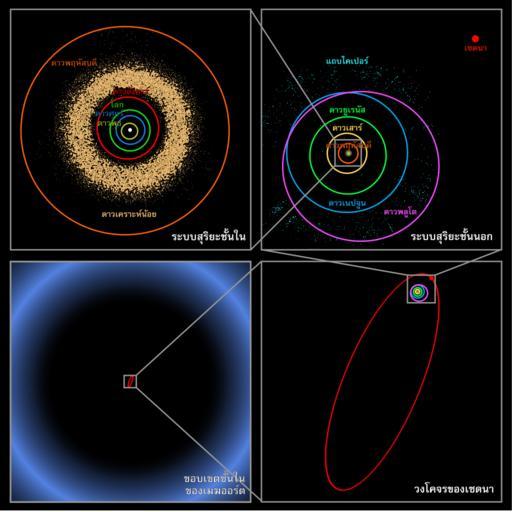MAKE A MEME
View Large Image

| View Original: | Oort cloud Sedna orbit-th.svg (2499x2499) | |||
| Download: | Original | Medium | Small | Thumb |
| Courtesy of: | commons.wikimedia.org | More Like This | ||
| Keywords: Oort cloud Sedna orbit-th.svg These four panels show the location of trans-Neptunian object 90377 Sedna which lies in the farthest reaches of the Solar system <ref>http //www spitzer caltech edu/Media/releases/ssc2004-05/release shtml Most Distant Object in Solar System Discovered Press release Jet Propulsion Laboratory March 15 2004 </ref> Each panel moving clockwise from the upper left successively zooms out to place Sedna in context The first panel shows the orbits of the inner planets and Jupiter; and the asteroid belt In the second panel Sedna is shown well outside the orbits of Neptune and the Kuiper belt objects Sedna's full orbit is illustrated in the third panel along with the object's location in 2004 nearing its closest approach to the Sun The final panel zooms out much farther showing that even this large elliptical orbit falls inside what was previously thought to be the inner edge of the spherical Oort cloud a distribution of cold icy bodies lying at the limits of the Sun's gravitational pull Sedna's presence suggests that the previously speculated inner disk on the ecliptic does exist Thai SVG version of Image Oort cloud Sedna orbit jpg which lists the following sources http //photojournal jpl nasa gov/catalog/PIA05569 http //ipac jpl nasa gov/media_images/ssc2004-05c_medium jpg http //www spitzer caltech edu/Media/releases/ssc2004-05/ssc2004-05d shtml Splitzer Space Telescope Released Images about Sedna March 15 2004 original image August 2006 SVG conversion Image courtesy of NASA / JPL-Caltech / R Hurt Original text courtesy of NASA / JPL-Caltech SVG conversion by Holek Public domain see below English SVG version English JPEG version en Media Ssc2004-05b medium jpg en Media Sedna-NASA JPG en Media 56755main sedna-comp-330-264 jpg French version <references/> The original image PD-USGov-NASA SVG version Oort cloud Sedna | ||||